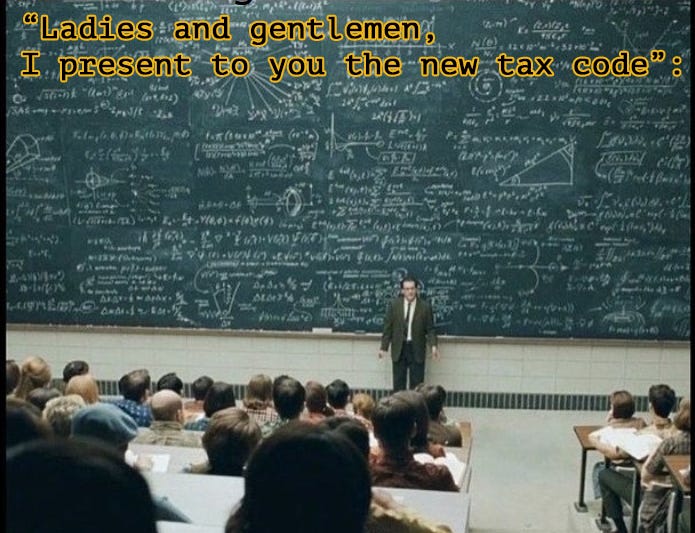The One Big Beautiful Bill Act
EP 37 of The Money Alchemist Podcast: Some beauty is skin deep.
Reinforcing a modern political trend, the One Big Beautiful Bill Act (OBBB) garnered only strict partisan support. Carrying the timbre of our nation’s President, its name either strikes a nerve with unbearable annoyance or tickles the funny bone. A dichotomy to define out times. One many have grown weary of.
Now signed into law, few Americans are unaffected by its reach. Even fewer still understand the full scope of its consequences. The CBO estimates $2.4T – 3.3T will be added to the Federal deficit over the next decade while the White House claims a $1.4T deficit reduction over the same period with tariffs.
The appropriate way to view such estimates is with extreme suspicion. Like the odds that an astronaut will land a hole-in-one from the wing of the International Space Station. The CBO thinks they can do it. The White House believes the earth and hole will be pulled into the gravity well of the ball. It’s all haruspication.
No one accurately forecasted our national debt a decade ago, currently sitting at $37T and counting. Directionally, the CBO’s estimate is probably more correct given strong incentives for policy makers to deficit spend.
But who cares about something as banal as the national debt, we want the beautiful eye candy. The OBBB does not disappoint in this aspect, delivering on promises of substantial tax relief for individual taxpayers.
This comes as no surprise as it was a major cornerstone of the current administration’s campaign and the necessary showpiece for public support. Some of the major upgrades to the tax code include:
Permanent extension of the lower Federal brackets passed as temporary relief for individual taxpayers in the TCJA (2017).
Permanent doubling of the standard deduction with a doubling of the inflation adjustment for 2026.
Permanent child tax credit of $2,200 per qualifying child (under 17), indexed for inflation.
Permanent 20% deduction on Qualified Business Income (199A deduction).
· Permanently set the Federal estate tax exemption at $15M per individual with an inflation adjustment.
Added the “Trump Account” for minors with a $5,000 annual contribution limit and one-time $1,000 Federal government contribution for babies born 2025 – 2028.
Added an additional $6,000 per person deduction on top of the standard deduction for taxpayers 65 and older, subject to phase outs.
Charitable contributions up to $2,000 (MFJ) can now be taken even if the standard deduction is elected.
Temporary tax relief on income earned through tips and overtime from 2026 through 2028 (phased out at $150k Single / $300k MFJ)
Temporarily lifted the state and local income tax (SALT) deduction limit to $40k for households with an AGI of $500k or less, reverting to $10k with 1% annual inflation adjustment in 2030.
There are more obscure updates made to the tax code in the 800+ page bill signed into law, but we’ve covered the highlights. Much of it is still being digested by tax and legal firms and/or requires clarification from the IRS.
While we love eye candy, the beautification process is both complex and painstaking. A principal that holds true in the application of this legislation. All the ‘beautiful’ parts of the law require effort and guess who gets to apply the makeup?
You. True to form, policy makers have further complicated an already convoluted tax code. The real winners are financial planners and full-service CPA firms, although the net effect is lower taxation across the board for most taxpayers.
So much for simplifying the tax code.
To offset the projected cuts in tax revenue, lawmakers looked to niche tax increases and spending cuts, specifically in Medicaid. We need not cover one obvious source of additional tax revenue in 2025, tariffs, but other tax increases were included in the final Bill.
For one, many university endowments will see their net investment income tax climb from 1.4% to as high as 8%. Still lower than personal tax rates but an increase, nonetheless.
Second, AMT provisions were adjusted that will slightly increase the number of American subject to Alternative Minimum Tax. Chances are it will not affect you unless a significant portion of your compensation comes from ISOs.
The ugly part of the legislation were the necessary cuts to welfare programs, Medicaid in particular. It’s important to not conflate Medicaid with Medicare. The two programs may share 6 out of 8 letters but are very different.
There are no cuts to Medicare or Social Security as part of the OBBB, which are the programs many retirees depend on. The same is not true for Medicaid, which is the socially subsidized health insurance program for qualifying individuals living in the US.
Qualification status varies by state given each manages their Medicaid programs separately using Federal funding. The OBBB establishes more strict qualification criteria than currently exist in most states. The obvious effect is less individuals will qualify, hence the reduction in spending.
Some estimate that as many as 10 million with be shifted off fully subsidized Medicaid plans to an uninsured status or partially subsidized ACA plans. Regardless, it marks a notable shift in policy support for Federal redistribution programs.
Decrying the spending cuts may be cathartic to those standing in opposition, but it fails to properly consider the full scope of potential long-term consequences. The most significant of which being an increased reliance on US Treasury bond sales to fund current and future spending.
Heavy reliance on debt to fund operations destabilizes currencies and the economies that use them. So long as the dollar remains the world reserve currency, the appetite for its debt will remain quite high. Even so, it’s not without drawbacks.
Deficit spending diverts inflation into financial assets, which will further exacerbate wealth disparities. Marie Antoinette might have offered a more personal account on where this could lead but tragically, she lost her head during her exit interview.
More than ever, it’s important to save and invest to gain a footing on society’s social ladder. There’s an idea for a portion of your tax savings. You’ll certainly need it.
For a more in-depth breakdown of the OBBB, listen to the latest episode of The Money Alchemist Podcast where we dig into the legislation.
About your Hosts
Ben Jones, CFP®
Managing Director, National Wealth Management Group
Brent Gargano, CFP®
Founder & Advisor, Infinite Wealth Planning
www.infinitewealthplanning.com
Investment advice offered through National Wealth Management Group, LLC.
Information in this podcast should not be construed as tax advice. Consult with your tax professional for specific advice on your situation.
The information presented is for educational and informational purposes only and is not intended as a recommendation or specific advice.







